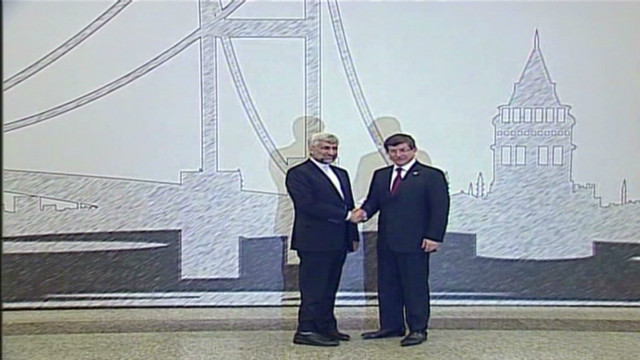
After months of tension and frustration, key world powers and Iran sounded more optimistic Saturday after "constructive and useful" talks about Tehran's intentions for its nuclear program.
"We have agreed that the nonproliferation treaty forms a key basis for what must be serious engagement to ensure all the obligations under the treaty are met by Iran while fully respecting Iran's right to the peaceful use of nuclear energy," EU foreign policy chief Catherine Ashton said following the meeting with Iran's top negotiator, Saeed Jalili.
Ashton said Saturday's meeting in Istanbul was a basis to establish a "sustained process of serious dialogue."
The next meeting between Jalili and delegates from the five permanent members of the United Nations Security Council -- the United States, France, Russia, China, and Britain -- and Germany, will be held May 23 in Baghdad.
Jalili insisted that the goal of his nation's nuclear program is to produce energy, not weaponry. He stressed, too, that Iran "should enjoy our rights" to have nuclear energy.
That said, Jalili also noted the "positive approach" of the recent talks, saying they furthered the "process of cooperation."
Ashton and Jalili said that experts will meet before May 23 to create a detailed framework for future discussions about Iran's program.
"We expect that subsequent meetings will lead to concrete steps toward a comprehensive negotiated solution which restores international confidence in the exclusively peaceful nature of the Iranian nuclear program," Ashton told reporters.
The group of delegates -- also known as the P5+1 -- has spearheaded diplomatic efforts to persuade Iran to rein in its nuclear program, which Iran has said is purely peaceful. U.N. and Western leaders suspect it of having military aims, including a possible nuclear weapon.
All sides agreed to postpone talks about the details of Iran's nuclear program to a later date.
Ashton said that future dialogue would involve the principle of a "step-by-step approach and reciprocity."
Asked specifically what she meant, Ashton told CNN the steps "will be designed to build the confidence that there isn't going to be a nuclear weapons program. That might be, for example, enabling inspectors to have more access."
Reciprocity, Ashton indicated, could include rewarding Iran, which is under significant global sanctions, if it dismantles inappropriate programs.
"But that needs to be very carefully thought about," she said. "And it is very important that we recognize the importance of sanctions in taking and actually getting us to today."
Iran last met with the six powers for talks on its nuclear program 15 months ago. That meeting, also in Istanbul, was widely regarded as ending in failure when Iran presented what the international side said were preconditions for talks.
Jalili told CNN later Saturday said his country has supported positive dialogue.
"We have always said confidence building has been a two-way street," he said.
Going into Saturday's meeting, the indications from behind the scenes were that both sides wanted to make progress.
Ashton said the P5+1 wanted to know whether Iran was serious toward moving toward a sustained process.
Apparently, the group was satisfied by Iran's rhetoric.
Iranian Foreign Minister Ali Akbar Salehi said in an opinion piece published Friday in the Washington Post that Tehran is committed to a peaceful program, but it needs to see trust from the international side.
"Despite sanctions, threats of war, assassinations of several of our scientists and other forms of terrorism, we have chosen to remain committed to dialogue," he wrote.
"In the upcoming talks, we hope that all sides will return to the negotiating table as equals with mutual respect; that all sides will be committed to comprehensive, long-term dialogue aimed at resolving all parties' outstanding concerns; and, most important, that all sides make genuine efforts to reestablish confidence and trust."
Iran has been under increasing pressure to accept international demands to restrict its nuclear program, including a series of harsh economic sanctions imposed by European nations and the United States. It hopes future negotiations will lead to an end to those sanctions.
Last month, Iranian officials signaled that they were ready to engage with the International Atomic Energy Agency, the U.N. nuclear watchdog, over the issue.
Iran suggested last week that one proposal may be a reduction in the amount of uranium it enriches to 20%, but it was unclear if such a proposal was still on the table.
While the enrichment isn't enough to create nuclear weapons, which require a uranium content of 90% or more, analysts and inspectors say it is a step toward being able to create a nuclear weapon.
Last month, the IAEA noted what it called a sharp and troubling increase in Iran's uranium enrichment capabilities.
Iran says the enrichment is for research and medical needs.
As a signatory to the Nuclear Nonproliferation Treaty, Iran has the right, like other countries, to enrich uranium for commercial and research reactors. But the same facilities that are used for peaceful enrichment can be used to enrich uranium for a bomb, and inspectors say they have not been able to fully gauge Iran's intentions.
Aucun commentaire:
Enregistrer un commentaire
welcome